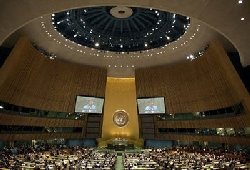Calling nuclear weapons "disgusting and shameful," Iranian President Mahmoud Ahmadinejad urged the United Nations on Monday to punish countries like the United States that threaten to use them.
Secretary of State Hillary Clinton dismissed Ahmadinejad's comments as the "same tired, false and sometimes wild accusations" and urged nations to focus on efforts to bring Iran to heel over its nuclear program.
In keeping with past practice during annual U.N. General Assembly gatherings, the delegations of the United States, Britain, France, Germany and others walked out of the chamber during Ahmadinejad's speech.
"The possession of nuclear arms is not a source of pride," he said at the start of a month-long review conference of the 189 signatories of the 1970 nuclear Non-Proliferation Treaty.
"It is rather disgusting and shameful. And even more shameful is the threat to use, or to use, such weapons."
Ahmadinejad, the highest-ranking official to attend the conference, called for "considering any threat to use nuclear weapons or attack against peaceful nuclear facilities as a breach of international peace and security."
States making such threats should face "swift reaction" from the United Nations and be ostracized by NPT members.
Clinton later called for similar stiff penalties against countries like Iran that violate their treaty commitments.
The United States and its allies accuse Iran of developing the capability to make nuclear weapons under cover of a civilian atomic energy program. Tehran insists it is interested only in generating electricity but has a long record of hiding sensitive nuclear activities from U.N. inspectors.
The Western walkout came as Ahmadinejad charged that Israel threatened its neighbors with terror and invasion and enjoyed unconditional support from Washington and its allies.
Israel never signed the NPT. Israel is presumed to have a sizable nuclear arsenal but neither confirms nor denies its existence.
North Korea withdrew from the NPT in 2003 and conducted atomic tests in 2006 and 2009.
The U.S. nuclear posture review, released last month, reduces the role of atomic weapons in U.S. defense policy but does not rule out their use against countries like Iran and North Korea that are considered to be NPT 'violators'.
The Iranian president did not mention his country's uranium enrichment program, which Tehran has refused to suspend, prompting the U.N. Security Council to impose three rounds of sanctions on Iran.
The United States, Britain, France, Germany, Russia and China are now discussing possible new sanctions.
In his speech, U.N. Secretary-General Ban Ki-moon urged Ahmadinejad to take part in a U.N.-backed nuclear fuel offer that Iran accepted in October but later balked at. Ban called the deal "an important confidence-building measure."
Ahmadinejad denied rejecting it. "To us, it is an accepted deal," he said, adding the ball was in the West's court.
Clinton said Iran had shown no sign of accepting the deal.
The United States, Britain, France, China and Russia -- the permanent, veto-holding members of the Security Council -- were allowed to keep their nuclear weapons under the NPT but pledged to launch negotiations on scrapping their arsenals.
Non-nuclear weapon states complain the five have not done enough to disarm.
PHOTO CAPTION
Iran President Mahmoud Ahmadinejad speaks during the 2010 High-level Review Conference of the Parties to the Treaty on the Non-Proliferation of Nuclear Weapons at the United Nations In New York.
Reuters


 Home
Home Discover Islam
Discover Islam Quran Recitations
Quran Recitations Lectures
Lectures
 Fatwa
Fatwa Articles
Articles Fiqh
Fiqh E-Books
E-Books Boys & Girls
Boys & Girls  Ramadan
Ramadan Fatwa Audios
Fatwa Audios Month of Mercy
Month of Mercy Women
Women Eed Al- Fitr
Eed Al- Fitr Food Recipes
Food Recipes Videos
Videos

 Prayer Times
Prayer Times












